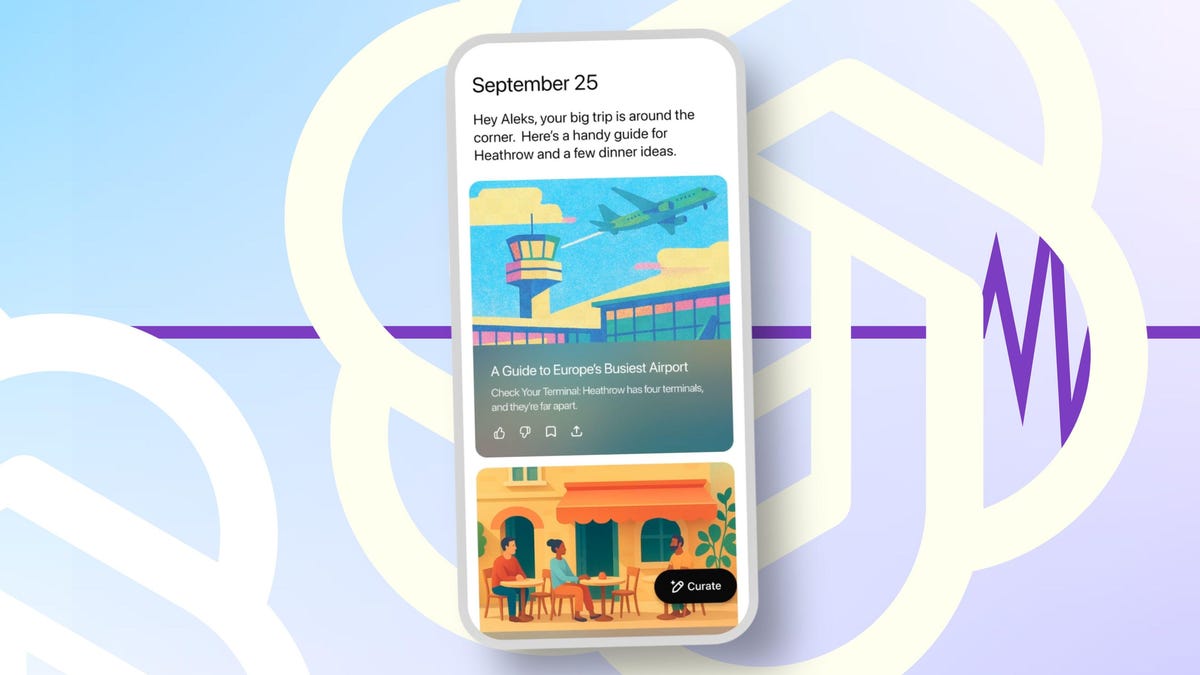Follow ZDNET: Add us as a preferred source on Google.
ZDNET’s key takeaways
- ChatGPT Pulse will send you personalized updates each day.
- The updates are based on your chat history, memories, and feedback.
- Pulse is now limited to ChatGPT Pro users, but it will expand to Plus users.
Normally, you have to initiate a conversation with ChatGPT to get the AI’s attention. But a new option aims to reverse that process by sending you a daily personalized update based on your chat history.
Also: How researchers tricked ChatGPT into sharing sensitive email data
Known as ChatGPT Pulse, the feature is now available in preview mode for mobile users. However, it’s limited to ChatGPT Pro users, who have to shell out a hefty $200 a month for access to early or more advanced capabilities.
How ChatGPT Pulse works
To devise the updates, ChatGPT proactively looks at your chat history, your saved memories, your feedback about the AI, and any connected apps such as your calendar. Based on a collective stew of all that information, the updates appear as topical visual cards for you to scan or view in greater detail. You can tweak the details that Pulse provides to help it learn which information you find most useful and relevant.
Also: 10 ChatGPT Codex secrets I only learned after 60 hours of pair programming with it
ChatGPT conducts its research each night in time to deliver the update the following day. As a few examples offered by OpenAI, the updates could focus on topics you often discuss, tips for cooking a healthy dinner that evening, or long-term goals such as training for a triathlon. If you connect Gmail or Google Calendar to ChatGPT, the updates might also provide help on writing a meeting agenda, a reminder to buy a birthday gift, or restaurant recommendations for an upcoming trip.
Each update is accessible only for that day unless you save it or ask a follow-up question, which then stores it in your chat history. OpenAI promises that the topics go through safety checks, so you shouldn’t see any harmful or inappropriate content that would violate the company’s guidelines.
To put Pulse through its paces, OpenAI enlisted college students as early testers. Based on feedback, the students felt the feature became more helpful once they started telling ChatGPT what they wanted to see in the updates.
Also: How people actually use ChatGPT vs Claude – and what the differences tell us
In one case, a student who chatted with ChatGPT about managing time off for a grant period in Taiwan received several helpful and practical steps from the AI. In another case, a student said that ChatGPT realized he was going back to school after a long break and provided updates on what had changed in his college town over the past six months.
Pulse is in preview mode
Since Pulse is in preview mode, OpenAI cautions that it may get things wrong and offer suggestions that don’t land. But as more people give it a whirl, the AI will hopefully learn and develop.
Also: I built a business plan with ChatGPT and it turned into a cautionary tale
Following the early use and feedback, OpenAI promises to expand the feature to ChatGPT Plus users. As for the future, the company envisions that Pulse will be able to connect with more apps and deliver relevant updates throughout your day.
“By combining conversation, memory, and connected apps, ChatGPT is moving from answering questions to a proactive assistant that works on your behalf,” OpenAI said in its introduction to ChatGPT Pulse. “Over time, we envision AI systems that can research, plan, and take helpful actions for you–based on your direction–so that progress happens even when you are not asking.”
